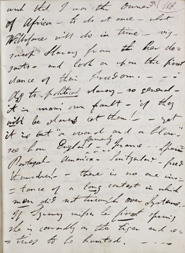
I managed to catch the King’s College exhibition about Byron just in time – it closes on Wednesday. The exhibition is displayed in the beautiful Weston Room, part of the Maughan Library, and was curated by the Foyle Special Collections Library of King’s College London and the John Murray Archive of the National Library of Scotland, for the 39th International Byron Conference in July (there’s an International Byron Conference! How awesome!).
I wanted to see the exhibition for two main reasons. One: it is full of manuscripts and rare books, which are always interesting. Two: it’s Byron! I have a bit of an obsession with the man, so there was no way I was going to miss this.
‘Byron and politics’ takes a slightly different look at the “mad, bad and dangerous to know” poet’s life, focusing on his political life and bringing together manuscripts, letters, printed editions and several of Byron’s personal possessions. The exhibition explores the contradictions in the poet’s thought and life: he hated the ruling Tory party but also disliked their opponents the Whigs; he was an aristocrat with a seat in the House of Lords, yet he spoke up for the poor and needy, notably in his Parliamentary speech in which he championed the cause of the Nottinghamshire Luddites; he was in love with the idea of democracy yet refused to admit the poor he knew to be capable of taking part in it. Byron greatly admired Napoleon and was overwhelmingly disappointed when he chose exile over a ‘noble death’. He himself met his end in Missolonghi, Greece, fighting for the cause of Greek independence.
For someone whose reputation is of a wild, wicked, immoral and frivolous poet, Byron’s deep engagement with the political issues of the day are something of a revelation. This aspect of his life shows, perhaps, a deeper side to his character and a more serious one. He also seems to have had a strong sympathetic understanding of the less fortunate, though ultimately he refused to side with any one party or way of thinking, preferring to form his own views. I took a copy of the exhibition guide, so that I can revisit this aspect of Byron’s life in the future.
